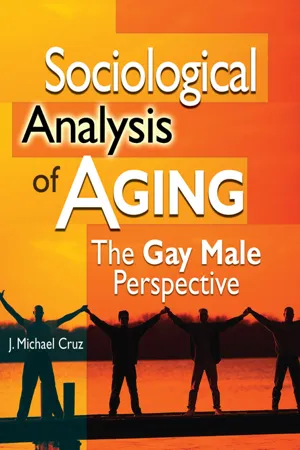
- 138 pages
- English
- ePUB (mobile friendly)
- Available on iOS & Android
About This Book
Sociological Analysis of Aging: The Gay Male Perspective is an exploratory study of the life changes homosexual and bisexual men experience as they age. This unique book presents in-depth, qualitative interviews with gay men, aged 55 and older, focusing on their physical, mental, and social needs. More than one hundred men offer first-hand perceptions on the unique problems they face with regards to employment/retirement, housing, health and well-being, and relationships, and how they function within (or without) a social support system. Sociological Analysis of Aging fills in the gaps in the existing social science literature on homosexuals and aging, updating findings that were inconclusive when first published and/or based on case studies or limited samples. While standard books on aging typically deal with the impact of life events such as child rearing, the empty nest syndrome, and grandparenting, Sociological Analysis of Aging deals with the unique realities that gay men face in addition to the universal concerns of the elderly: affordable health care, affordable housing, and adequate coverage for medication costs. The study examines what can be done to assist successful aging for sexual minorities, particularly in the areas of social policy, service delivery, and public tolerance. Sociological Analysis of Aging focuses on specific research questions:
- Do aging gay men consider themselves to be physically healthy?
- Do aging gay men suffer from depression?
- Do aging gay men have access to social support networks?
- What are the housing needs of the aging gay communitypresent and future?
- How involved are aging gay men with family, friends, church, and community?
In addition, the men interviewed were asked what, if anything, was left on a to-do list; what the best and worst aspects of aging are; and what, if anything, they would change about the course their lives had taken. Their answers make Sociological Analysis of Aging: The Gay Male Perspective an essential resource for therapists, counselors, and social workers, and for academics working in sociology, psychology, gerontology, and gay studies.
Frequently asked questions
Information
Table of contents
- Cover
- Half Title
- Title Page
- Copyright Page
- Dedication
- Table of Contents
- Foreword
- Preface
- Acknowledgments
- Chapter 1. Introduction
- Chapter 2. Literature Review
- Chapter 3. Methodology
- Chapter 4. Findings
- Chapter 5. Discussion and Conclusion
- Appendix A. Respondent Characteristics by City (Percentages)
- Appendix B. Research Instruments
- References
- Index